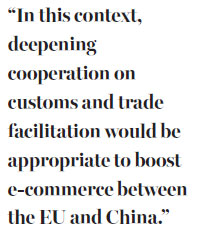EU needs forward-looking China plan
Updated: 2016-07-29 08:02
By Luigi Gambardella(China Daily Europe)
|
|||||||||
Bloc needs to be ambitious and more focused on opportunities for economic cooperation
Ten years after publishing their last one, the European Union's foreign ministers on July 18 endorsed the Elements for a New EU Strategy on China, which contains a comprehensive overview of China-EU relations and the main challenges ahead.
The document is not, first of all, addressed to the Chinese authorities but to EU member governments and the European Parliament, and seeks to build a consensus on EU-China policy for the coming years.
I therefore wait impatiently for the response. Will the EU institutions support more-ambitious EU-China cooperation or will they come back on issues of the past? Let us see.

Personally, I hope they will focus on the future, on the opportunities China brings and will bring to Europe, instead of raising a lot of preconditions before proceeding to further cooperation.
We need an ambitious strategy and more focus on opportunities for economic cooperation.
Let's not forget that the EU has daunting challenges to deal with internally: Brexit, the Greek problem, the refugee crisis, the over indebtedness of most governments. The Elements for a New EU Strategy on China acknowledges that enhanced China-EU cooperation is part of the solution.
"The EU's economic strengths are complementary to the priorities of China's 13th Five-Year Plan (2016-2020), such as innovation, services, green growth and balancing urban and rural development," it says. "Mutually beneficial cooperation on all aspects of investment should be increased, including by finding practical ways for China to contribute to the investment plan for Europe."
The willingness of the EU to explore synergy between the two development strategies is a good start.
For the time being, what is striking in the Elements document is the key role assigned to the EU-China Connectivity Platform, which was launched in June last year as a vehicle to connect the Eurasian continent through a physical and digital network. The network would enable the flow of trade, investment and people-to-people contact.
China is moving fast, much faster than Europe. The EU has a strong interest in working with China. According to the EU strategy, cooperation on the digital economy should harness growth through open markets, common standards and joint research on the basis of reciprocity in areas such as 5G mobile communications and the internet of things.
There is nothing more exciting than knowing two of the giant digital global players will join hands and lead the digital revolution. With the EU's know-how and mature legislation system, and China's huge market needs and fast-moving innovation on advanced technology, the EU and China are natural partners.

The Elements list actions, but they should be complemented - once adopted - with concrete projects. It advocates "mainstreaming key themes and objectives across all EU-China dialogues and concentrating resources on a smaller number of priorities where the EU has the greatest added value". This year should be the year of delivery.
The EU wants a China that is economically more open and stable, with significantly improved market access for foreign companies. A company like Alibaba could play a key role in this process by providing the EU companies - and in particular small and medium-sized enterprises - a platform to reach Chinese undertakings and consumers. In this context, deepening cooperation on customs and trade facilitation would be appropriate to boost e-commerce between the EU and China.
At the same time, the EU should establish a common minimum definition of what constitutes critical national infrastructure in the context of inward investment, to provide legal certainty and promote investment.
Leading Chinese telecom companies should have a clear framework to invest in European telecom operators and bring them the benefits of their critical mass and innovative management culture.
The author is president of ChinaEU, a business-led association that aims to strengthen joint research and business collaboration and investment in internet, telecommunications and high-tech between China and Europe. The views do not necessarily reflect those of China Daily.
(China Daily European Weekly 07/29/2016 page11)
Today's Top News
Obama, Merkel stress anti-terror cooperation
Downing Street cat fight: Larry vs Palmerston
No explosion, no injury report in Germany: Police
Geneva airport tightens security after French tipoff
Bill Clinton portrays Hillary as 'change-maker'
Priest, 84, killed in France, attack claimed by IS
Knife attacker in Japan kills 19 at disabled center
Michelle Obama rocks Democratic convention
Hot Topics
Lunar probe , China growth forecasts, Emission rules get tougher, China seen through 'colored lens', International board,
Editor's Picks

|

|

|

|

|

|







